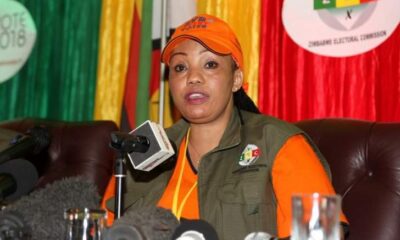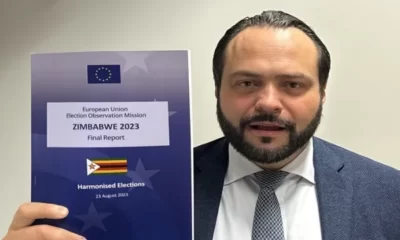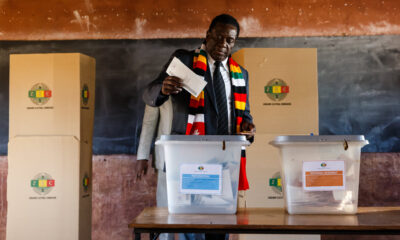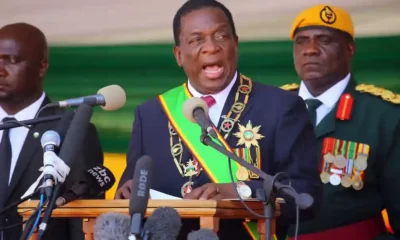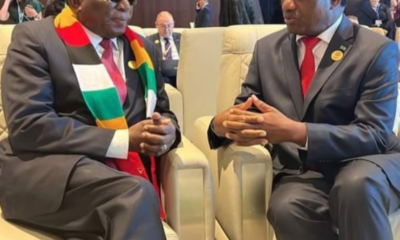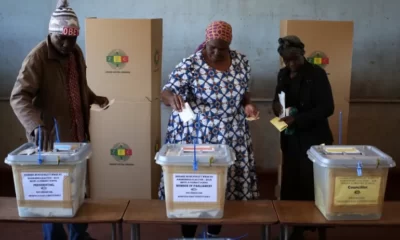THE Carter Centre Observer Mission to Zimbabwe has poked holes into the country’s general election, saying the electoral process did not adequately respect regional and international commitments for democratic and inclusive elections.
NATHAN GUMA
As a result, contestants’ ability to compete on an equal basis was undermined, the non-profit organisation says.
Apart from a plethora of anomalies, the election was marred by voter intimidation and logistical challenges which resulted in some polling stations, especially in opposition strongholds, opening at night.
President Emmerson Mnangagwa won the disputed election, which has been rejected by the Southern African Development Community Electoral Observer Mission (SEOM), in a major dramatic and unprecedented political move, leaving the elections extensively discredited.
More observer missions, including the European Union Election Observer Mission (EOM), AU-Comesa and the Commonwealth, have also indicated inadequacies in Zimbabwe’s election,
Findings by the Carter Centre mission in its preliminary report released this week have revealed inadequacies, violation of electoral laws, intimidation and a possible exclusion of potential voters from the electoral process.
“The legal framework governing Zec operations does not fully ensure institutional independence. This includes the need to obtain approval from the Minister of Justice for legislative amendments proposed by Zec, among other things,” reads part of the preliminary report.
“The Zimbabwean constitution stipulates that after the call for elections, no change to the electoral law or to any other law related to the elections shall be made. Following the proclamation of elections on May 31, 2023, however, the legal framework for elections was changed through amendments to Electoral Act and Statutory Instruments (SIs), which is at odds with international best practices.
“For instance, the general election was thrown into turmoil after the government controversially changed the Electoral Act to alter the deadline of postal votes.”
Zec confirmed that the government gazetted Statutory Instrument 140A of 2023 which altered the deadline for the submission of postal voting materials to it from 9 August to 20 August due to delays triggered by a series of electoral court cases.
The mission has also underlined irregularities in voter registration, which was shorter, raising fears that potential voters could have been left out.
Zec’s voter registration blitz ran from March 12-26, and saw the electoral body registering more than 450 000 voters. The exercise, which ran for 19 days is shorter than that of 2018, which was allocated 72 days.
Zimbabwe has continuous voter registration that has been under the administration of Zec since 2013. Biometric details started being captured in 2018 to allow for removal of duplicate entries. In addition to permanent registration centres, Zec also provides mobile registration before each election, commonly called a “voter registration blitz”.
“For the 2023 elections, the period for the voter registration blitz was shorter than in previous elections, running from March 12-26, 2023, during which Zec managed to register more than 451 811 voters and to transfer 191 738 registered voters to their new locations. While there were some initial technical issues, these were addressed by the Zec through a four-day extension of the process,” read the report.
“In accordance with section 21(1) of the Election Act, Zec conducted a public inspection of the voter roll from May 27 to June 1, which also was shorter than in previous elections. Zec did not inform the public about any efforts to remove voters residing outside of their constituency for more than 18 months, which resulted in selective application of the law.”
The report has also flagged the government over its use of state resources to campaign for Zanu PF, giving it in an unfair edge over other political parties.
Failure to raise funds also saw other political parties fail to field parliamentary and presidential candidates.
“Coupled with regulatory requirements that effectively restricted opposition campaign efforts, this created an uneven playing field among political parties. In addition, there were several reports of voter intimidation, to the extent that some said they were scared to discuss politics with citizen observers,” the report said.
“In its report of August 16, 2023, the police said they had blocked 303 public gatherings after assessing they did not meet legal regulations for such gatherings. This resulted in the suppression of legitimate campaign activity in many cases.
“Supporters of the ruling party were observed disrupting opposition party campaign events, sometimes with violence. There also were isolated instances of both intra-party and inter-party violent clashes among party supporters. The inter-party violence resulted in one reported death in Harare on August 3, 2023.”
The mission also highlighted intimidation on opposition political party supporters, particularly the main opposition Citizens’ Coalition for Change (CCC) party leaders and supporters, by the governing Zanu PF party-affiliated NGO, Forever Associates Zimbabwe (Faz), particularly in rural areas.
“Citizen observers reported instances of people being coerced to attend ruling party rallies and of government aid being used as a campaign tool, including through the distribution of food and farming supplies at rallies,” said the report.
“In the lead-up to the polls, several interlocutors reported concerns regarding the presence and influence of traditional leaders. During the final day of the campaign, Carter Centre observers noted influential traditional leaders in Masvingo telling voters that they must check in at a ‘voter education desk’ during a particular party rally to have their names registered before being allowed to vote.”
The Carter Centre is a non-governmental, not-for-profit organisation founded in 1982 by former US president Jimmy Carter (pictured).


